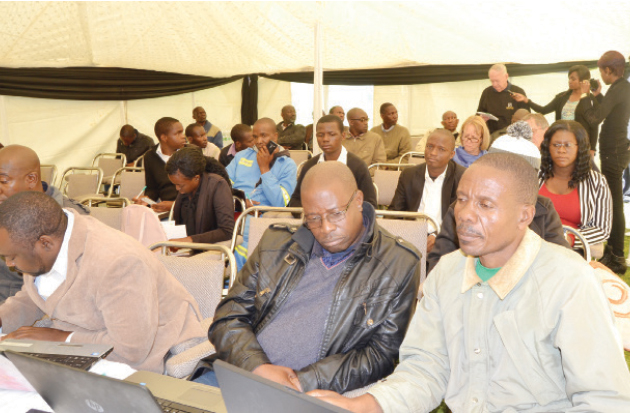Death penalty ‘inhuman, violates right to life’


Members of the Justice, Legal and Parliamentary Affairs portfolio committee follow proceedings during a public hearing meeting at a city hotel yesterday
Nqobile Tshili Chronicle Correspondent
BULAWAYO residents yesterday told a parliamentary public hearing that the death penalty should be scrapped from the country’s statutes as it emerged that two death-row prisoners in Harare recently approached the Constitutional Court challenging it.
They also questioned why there is discrimination in terms of its application as the new Constitution states that capital punishment applies only to men while the longest sentence for women can be life in prison.
Some residents said the death penalty was inhuman and violates the right to life which is also guaranteed by the same Constitution. Others bemoaned that the realignment of laws to the new Constitution was moving at a slow pace.
Vice-President Emmerson Mnangagwa, who oversees the Justice, Legal and Parliamentary Affairs portfolio, who was sentenced to death by the Ian Smith regime before the country’s independence only to survive because he was too young, has previously said he is opposed to capital punishment.
Making a contribution at a public consultation by the Justice, Legal and Parliamentary Affairs portfolio committee on Criminal Procedure and Evidence Amendment Bill and General Laws Amendment Bill yesterday, a Bulawayo resident said the law should be impartial.
“We’ve the death penalty. We need to be assured that every human being is treated equally. The Bill needs to address that men and women need to be treated equally this we say as gender advocates,” said a resident.
The chairperson of the committee, Jessie Majome, hailed Bulawayo residents for their participation and showing maturity in their contributions. “One of the topical issues was the death penalty which residents said there must be a restriction on. They also raised concerns on the arresting powers of the police. They said police aren’t supposed to shoot any suspects,” said Majome.
Today, the committee will be in the Midlands at Gweru Theatre and tomorrow they will be at Charles Austin Theatre in Masvingo. Majome called on the media to assist them in making the citizens participate in the hearings.
Our Harare Bureau reports that two death-row prisoners have launched a legal assault on the validity of the death penalty arguing it is not in conformity with the new constitutional dispensation. In a lawsuit filed in the Constitutional Court recently, Farai Lawrence Ndlovu and Wisdom Gochera listed Justice, Legal and Parliamentary Affairs Minister Emmerson Mnangagwa and Prosecutor-General Johannes Tomana as respondents.
They are seeking to scrap from the statutes Sections 47 of the Criminal Law (Codification and Reform) Act (Chapter 9:23) and Sections 337 and 338 of the Criminal Procedure and Evidence Act (Chapter 9:07).
The duo argues that the sections are not in conformity with the Constitution and should be declared unconstitutional.
They also want an order for all prisoners on death-row awaiting execution in the country to have their sentences commuted to life in light of the provisions of Section 48 of the new Constitution.
Lawyer Tendai Biti is representing the duo in the case that draws fresh attention to the ongoing argument over whether the penalty should be used in Zimbabwe at a time when most countries have abandoned it.
Ndlovu has been on the death-row for three years, while Gochera has spent 13 years at Chikurubi Maximum Security Prison awaiting execution.
Under the new law the penalty of murder can only be imposed where murder has been committed in aggravating circumstances, among other things.
Neither the Code nor the Criminal Procedure and Evidence Act makes any reference to aggravated circumstances.
Ndlovu, in his affidavit submitted to the apex court in the land, stated that the new Constitution that came into force on May 22 2013, provided for the right to life under Section 48. “It, however, allowed derogation of the right to life through a law that may be passed imposing the death penalty,” he stated.
“Neither section 47 of the code nor section 337 and 338 of the criminal procedure and evidence act . . . are in conformity with the constitution in particular section 48 of the Constitution of Zimbabwe.”
He further stated that although the two were convicted and sentenced in terms of the old law under an old Constitution, they were entitled to the benefit of the current supreme law.
“I contend that we cannot be executed now in light of the provisions of the new law and more importantly in light of the fact that the law envisaged under section 48 (2) of the Constitution has not been passed,” he said.
He argued that the question of sentence and the carrying out of any sentence was a matter of procedure governed by the existing law.
Gochera also filed his supporting affidavit. Ndlovu and his co-accused Wellington Kadzira were in 2012 convicted for the murder of Michael Sunderland and Geoffrey Andrew Povey. Kadzira has since died in prison.
The trial court heard that the two told the deceased pair that there was a gold rush near Kwekwe River and got into the back of the deceased’s vehicle.
They put cyanide poison into water bottles that were at the back of the vehicle, resulting in the death of Sunderland and Povey after they drank the poisoned water.
Gochera was convicted of murder with actual intent by the High Court in 2002 for murdering South Africa’s Spoornet International Railway executive secretary in September 2001.











Comments